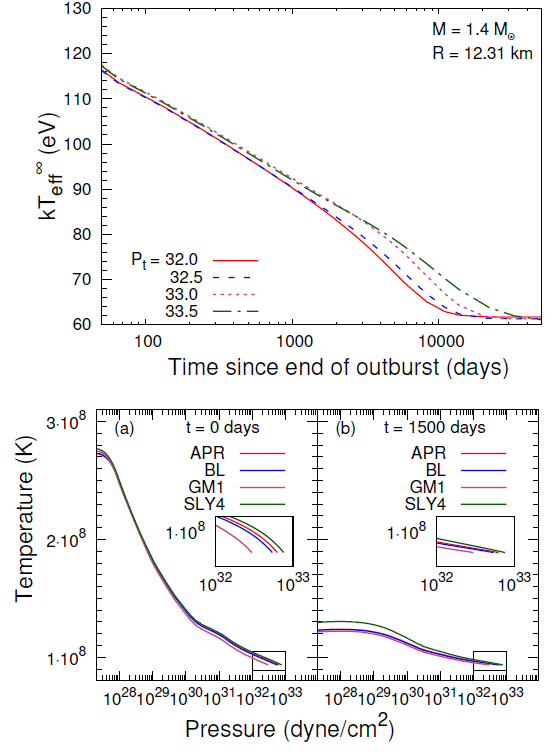MESA and dStar Results From the Meisel Group
Overview
This is a repository of inputs and results from MESA and dStar calculations performed by Zach Meisel and/or his research group at Ohio University. For more information about MESA, visit the MESA Marketplace and the MESA sourceforge page . For more information about dStar, vist the Astrophysics Source Code Library record ascl:1505.034 and Ed Brown's github page .Please cite the relevant paper if you use these results for a publication. If it's not clear what the relevant paper is, please contact me .

X-ray Burst Materials
Papers to Cite:- Z. Meisel, "Consistent Modeling of GS 1826-24 X-Ray Bursts for Multiple Accretion Rates Demonstrates the Possibility to Constrain rp-process Reaction Rates", Astrophysical Journal 860, 147 (2018).
- Z. Meisel, G. Merz, S. Medvid, "Influence of Nuclear Reaction Rate Uncertainties on Neutron Star Properties Extracted from X-ray Burst Model-Observation Comparisons", Astrophysical Journal, 872, 84 (2019).
General Comments:
If you want to try your own hand at MESA bursts, but don't have much experience, see the MESA page to get started, Ed Brown's MESA 2013 summer school lecture on creating a neutron star envelope, and Andrew Cumming's MESA 2015 summer school lecture on X-ray burst calculations.
You may want to compare the results shown here to the KEPLER burst library and/or the Reference burst library from Monash.
Grid a: This table contains results from a grid of bursts intended to approximate GS1826-24, or for similar conditions. The model names are ma#, where `m' is for MESA, `a' is for this grid of bursts, and the number is the burst variation number.
You can see the averaged burst light curves (with comparable Kepler bursts for reference) here .
The MESA inputs which can be used to reproduce these calculations can be downloaded in a zip file (35Mb) by clicking on this link .
The profiles (data vs depth) for every timestep of the 20th burst from model ma6 can be downloaded as a tgz file (6Gb, extract via tar -xzf) by clicking on this link . Burst ignition occurs at profile 50. Profile 180 is 128 seconds after ignition, which is around the time all nuclear burning (aside from decays) has ceased.
Grid b: This table contains results from a grid of bursts intended to approximate GS1826-24, or for similar conditions, while varying a number of reaction rates. The model names are mb#, where `m' is for MESA, `b' is for this grid of bursts, and the number is the burst variation number.
You can see the averaged burst light curves (with comparable Kepler bursts for reference) here .

Core Collapse Supernova Materials
Papers to cite:- S. Subedi, Z. Meisel, G. Merz, "Sensitivity of 44 Ti and 56 Ni production in core-collapse supernova shock-driven nucleosynthesis to nuclear reaction rate variations", Astrophysical Journal 898, 5 (2020).
General Comments:
The materials for this work are available on the MESA Marketplace . We followed the massive star evolution procedure of R. Farmer et al. ApJS 2016 and the CCSN modeling procedure of Paxton et al. ApJS 2015. The paper cited above contains details of which inlists to run and when, as well as modifications from the Farmer and Paxton works.

Crust Cooling Materials
Papers to cite:- S. Lalit, Z. Meisel, E.F. Brown, "Crust Cooling Models are Insensitive to the Crust-Core Transition Pressure for Realistic Equations of State", Astrophysical Journal 882, 91 (2019).
General Comments:
If you want to peform dStar calculations, the code (written by Ed Brown), can be downloaded from the Astrophysics Source Code Library as record ascl:1505.034 . dStar is a neutron star thermal evolution code, originally based on the work presented in Brown and Cumming 2009 . The dStar code itself is located on github and comes with a tutorial in the examples/ directory.
The following inlists are for calculations achieving a 12.31km radius 1.4 solar-mass mass neutron star (note the core mass and radius, not the total mass and radius, are specified in the inlist) using the crust-core transition pressures corresponding to the equations of state: APR , BL , GM1 , and SLY4 . These inlists roughly approximate the observed cooling of the source KS1731-26.

Please cite us!
For X-ray Bursts:- Z. Meisel, "Consistent Modeling of GS 1826-24 X-Ray Bursts for Multiple Accretion Rates Demonstrates the Possibility to Constrain rp-process Reaction Rates", Astrophysical Journal 860, 147 (2018).
- Z. Meisel, G. Merz, S. Medvid, "Influence of Nuclear Reaction Rate Uncertainties on Neutron Star Properties Extracted from X-ray Burst Model-Observation Comparisons", Astrophysical Journal 872, 84 (2019).
- S. Subedi, Z. Meisel, G. Merz, "Sensitivity of 44 Ti and 56 Ni production in core-collapse supernova shock-driven nucleosynthesis to nuclear reaction rate variations", Astrophysical Journal 898, 5 (2020).
- S. Lalit, Z. Meisel, E.F. Brown, "Crust Cooling Models are Insensitive to the Crust-Core Transition Pressure for Realistic Equations of State", Astrophysical Journal 882, 91 (2019).
